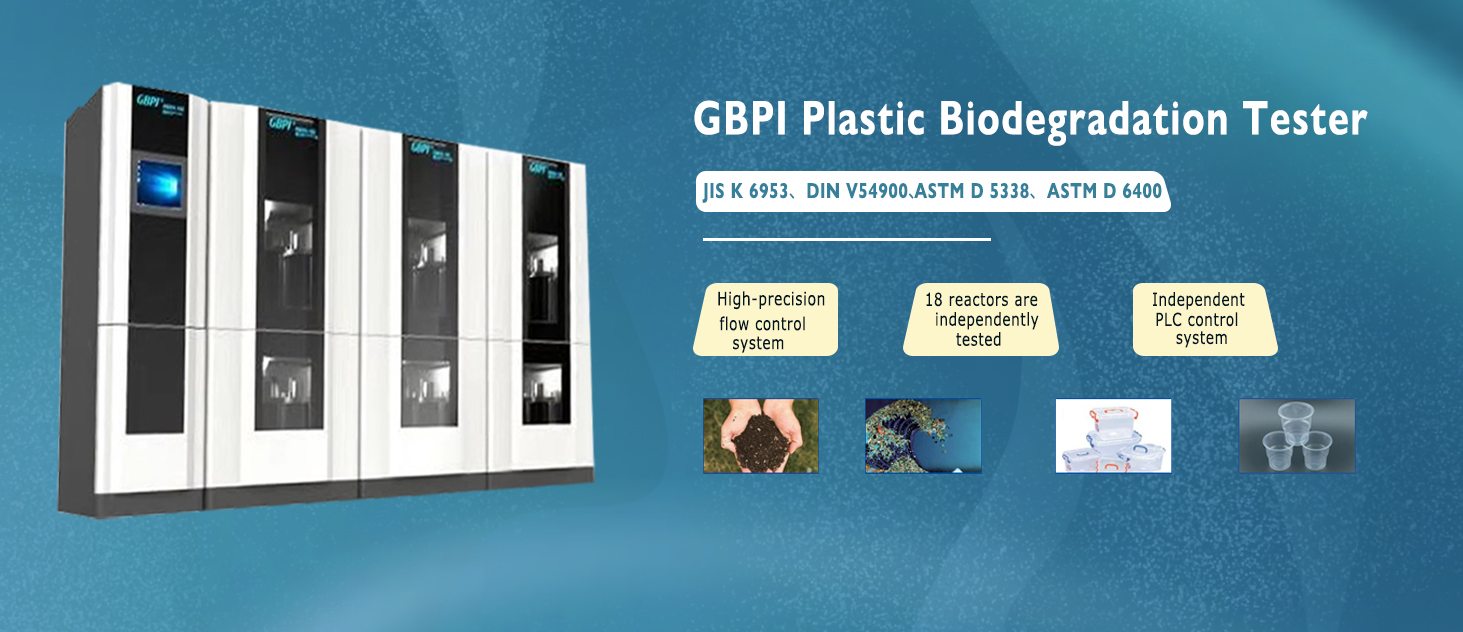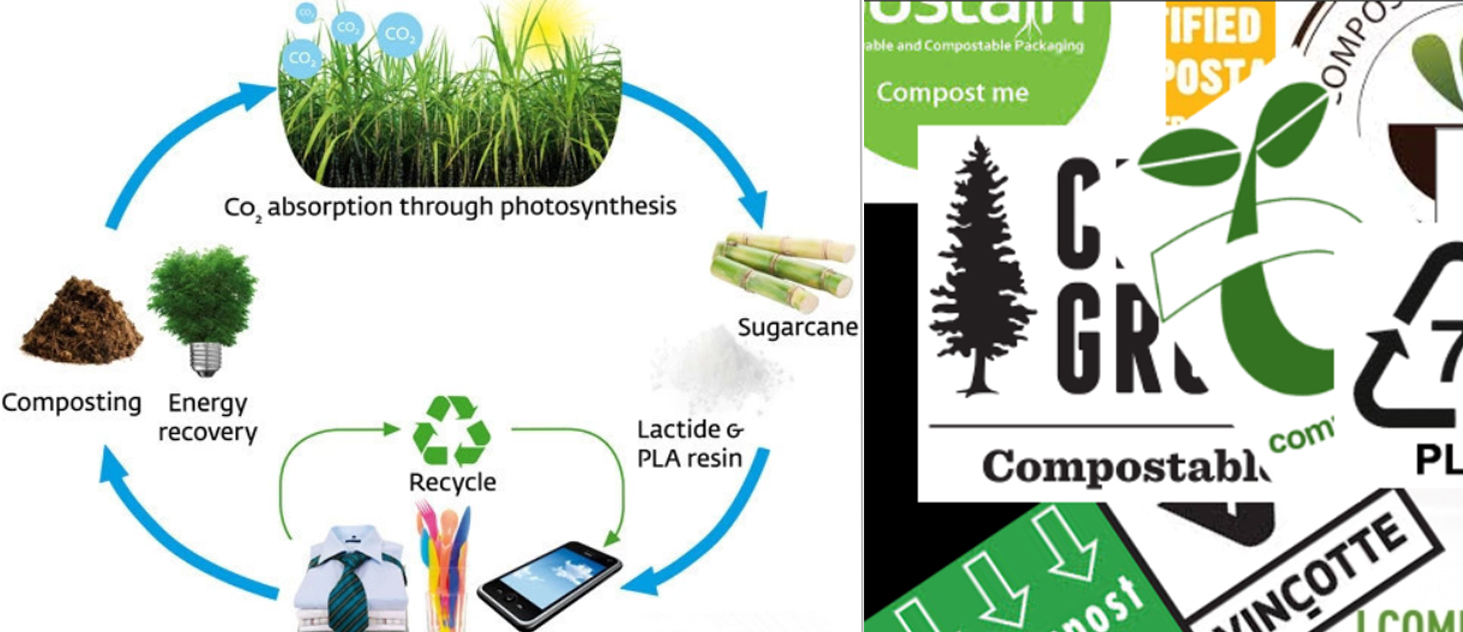
Компостируемый разлагаемый пластик — это разновидность биоразлагаемого материала, который относится к типу материала, который может быть полностью преобразован в углекислый газ, воду и минералы через определенный промежуток времени в условиях аэробного компостирования.
Биоразлагаемые материалы стали одним из эффективных способов решения проблемы загрязнения окружающей среды пластиковыми отходами, поскольку они могут относительно быстро разлагаться в естественной среде, что привлекло большое внимание людей, и страны во всем мире стремятся разработать биоразлагаемые материалы.
Биоразлагаемые материалы стали одним из эффективных способов решения проблемы загрязнения окружающей среды пластиковыми отходами, поскольку они могут относительно быстро разлагаться в естественной среде, что привлекло внимание людей, и страны во всем мире стремятся разработать биоразлагаемые материалы. Компостируемый разлагаемый пластик — это разновидность биоразлагаемого материала, который относится к типу материала, который может быть полностью преобразован в углекислый газ, воду и минералы через определенный промежуток времени в условиях аэробного компостирования.
Ниже приведены стандарты оценки и сертификаты компостируемых и разлагаемых пластиков в основных странах для справки!
Европейский Союз
The compostable and degradable plastic standard implemented by the European Union is the standard En 13432 "Requirements for the final evaluation of the packaging materials recovered by composting and biodegradation" established by the European Standards Committee. It is one of the important components of the European Directive 94/62/EC. One. En 13432 puts forward requirements and limits on compostable materials from four aspects:
A. Chemical substance restriction: stipulate the minimum content of organic substances, heavy metals and fluorine in compostable materials;
B Biodegradability: For controllable composting materials, more than 90% must be finally converted into carbon dioxide, water and minerals within 6 months under aerobic composting conditions;
C. Disintegration performance: stipulate the maximum thickness that the controllable compost material can be used. The controllable compost degradation material under this thickness must disintegrate more than 90% of the debris that can pass through the 22mm screen within 12 weeks of aerobic composting conditions;
D Eco-toxicological performance: after specially selected plants are introduced into compost decomposable materials of compostable degradable materials, the original survival rate and biological characteristics of more than 90% can be achieved;
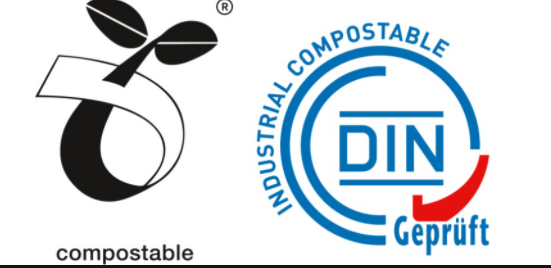
Seeding certification mark of DIN CERTCO, Germany
United States
The United States is engaged in biodegradable material standards, promotion and technology development work is the Biodegradable Products Institute (abbreviated as BPI). The standard for compostable and degradable plastics currently implemented in the United States is ASTM D6400 "Specifications for Composting Plastics."
A. Biodegradability: For a single polymer, it is stipulated that more than 60% of the controllable compost material must be finally converted into carbon dioxide, water and minerals within a maximum of 12 months under aerobic composting conditions. For blends, it is stipulated that more than 90% of the controllable composting materials must be finally converted into carbon dioxide, water and minerals within a maximum of 12 months under aerobic composting conditions;
B. Disintegration performance: For the maximum thickness of the controllable compost material that can be used, the remaining controllable compost degradation material must be disintegrated into more than 90% of the fragments that can pass through the 22mm screen within 12 weeks under aerobic composting conditions;
C. Eco-toxicological performance: After the selected plants are introduced into the compost decomposing materials of the controllable compost degradation material, the original survival rate and biological characteristics of more than 90% can be achieved.
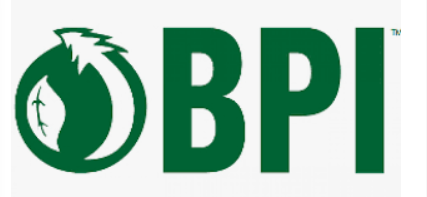
American BPI certification mark
Australia
The corresponding standard established by the Australian Standards Committee to regulate the controllable compost degradation materials entering the Australian market is AS 4736 "Biodegradable Plastics-Biodegradable Plastics Suitable for Composting or Other Biological Treatment Methods"
This standard is based on the European standard En 13432, and in addition to the eco-toxicological performance requirements, an earthworm eco-toxicological test has been added.
The specific requirements are;
A. Chemical substance restriction: stipulate the minimum content of organic substances, heavy metals and fluorine in controllable composting materials;
B Biodegradability: It is stipulated that more than 90% of controllable composting materials must be finally converted into carbon dioxide, water and minerals within the longest month under aerobic composting conditions;
C. Disintegration performance: It is stipulated that the controllable composting degradation material must be disintegrated into more than 90% of the fragments that can pass through the 22mm screen within 12 weeks under aerobic composting conditions;
D. Eco-toxicological performance: After introducing the compost decomposition material of the controllable compost degradation material, the selected plants can achieve more than 90% of the original survival rate and biological characteristics, and at the same time, it must meet the requirements of the earthworm in the introduction of the compost decomposition material of the controllable compost degradation material. After reaching more than 90% of the original survival rate and biological characteristics.
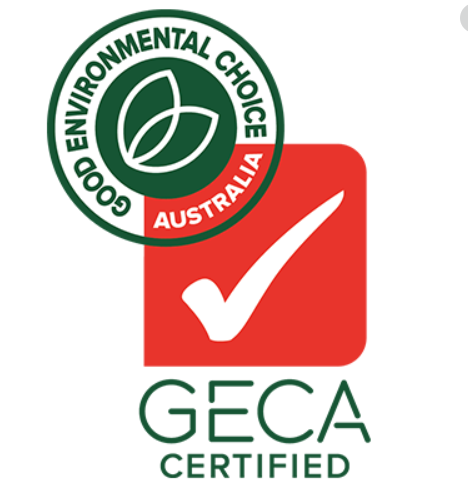
Australia's Good Environment Choice Mark.
Japan
Japan's biodegradable plastic certification is called "GreenPla Certification", which was initiated by the Japan Biodegradable Plastics Association (BPS).
From June 2000, BPS began to implement biodegradable plastic product certification standards, namely "GreenPla" logo certification, the certification standards are OECD 301C, and JIS K 6950, JIS K 6951, and JIS K 6953.
Japan’s current standard for degradable plastics with controlled composting is JIS K 6950 formulated by BPS.
A. Chemical substance restriction: stipulate the minimum content of organic substances and heavy metals in controllable composting materials;
B. Biodegradability: It is stipulated that more than 60% of controllable composting materials must be finally converted into carbon dioxide, water and minerals under aerobic composting conditions, and the specific time span is not clearly specified;
C. Disintegration performance: stipulate the maximum thickness of the controllable compost material that can be used. The controllable compost degradation material under this thickness must disintegrate into more than 90% of the fragments that can pass through the 22mm screen within 12 weeks under aerobic composting conditions;
D. Eco-toxicological properties: Selected plants can achieve more than 90% of the original survival rate and biological characteristics after introducing the compost decomposition material of the controllable compost degradation material, or the earthworm can reach 90% after the introduction of the compost decomposition material of the controllable compost degradation material. % Of the original survival rate and biological characteristics.
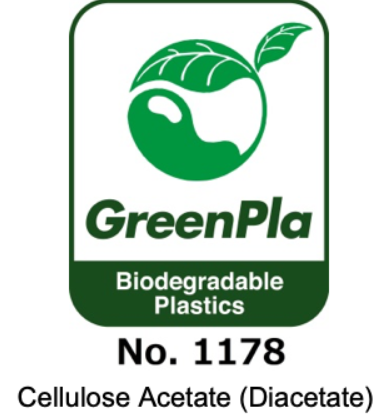
GreenPla certification mark of BPS in Japan
China
In 2006, my country promulgated the "Degradable Plastics Definition, Classification, Marking, and Degradability Requirements" standard. As a category of degradable plastics, controllable composting materials are clearly defined in the standard, and their biodegradability and collapse The solution performance is stipulated, and the specific stipulations are
A. Biodegradability: It is stipulated that the controllable composting materials must be converted into carbon dioxide, water and minerals at a maximum of 60 months under aerobic composting conditions;
B. Disintegration performance: stipulate the maximum thickness that the controllable compost material can be used. The controllable compost degradation material under this thickness must disintegrate into more than 90% of the fragments that can pass through the 22mm screen within 12 weeks under aerobic composting conditions;
At present, the relevant test standards that my country has announced are as follows:
GB18006.1-1999 "General Technical Requirements for Disposable Degradable Tableware",
GB/T18006.2-1999 "Test Method for Degradability of Disposable Degradable Tableware",
HJBZ12-2000 "Technical Requirements for Environmental Labeling Products for Packaging Products",
HBC1-2001 "Technical Requirements for Environmental Labeling Products of Disposable Tableware",
In the future, it is necessary to refer to the relevant test standards of developed countries in the world and my country, and combine with the market promotion of various products of degradable plastics, conduct in-depth research on the definition and evaluation methods of degradable plastics, and continuously improve and perfect the relevant test standards. The foundation and prerequisite of industrialization.
At present, there are relatively mature international standards in the evaluation standards for compostable plastics, such as En 13462, ASTM D6400 and AS 4736, etc.; there are already well-known certification bodies in the compostable plastics certification system, such as VINCOTTE and DIN CERTCO, etc. .
According to the requirements of environmental development, combined with our company's many years of biodegradation research and development technology and application experience, GBPI adopts patented intelligent algorithms, adhering to the people-oriented design concept, and the latest independent research and development of a high-end intelligent compost degradation test equipment. GBDA-180 Intelligent Compost Degradation Tester is the world's leading biodegradation analyzer tester based on the composting method to detect the corresponding substance and the maximum biodegradation rate under the condition of oxygen supply. It is also a tester for inspection and testing institutions and scientific research universities . One of the necessary equipment for research, analysis and testing of degradable materials. Let us work together to protect the beautiful earth home.
For more product informatio n about the compost tester, please contact us directly, and we will provide customers with solutions 24 hours a day. GBPI is a supplier of flexible packaging testing equipment , mask testing equipment , and testing solutions. It has more than 20 years of experience in the field of testing equipment. The company has a dedicated R&D and after-sales team, which can accept customer testing and on-site teaching machine services. Not only that, we can also help custom ers with one-stop customized laboratory testing solutions. GBPI has passed ISO 9001 certification, we have become a large-scale testing agency supplier, and cooperate with many international standards organizations.
В соответствии с требованиями заказчика мы можем предоставить сертификаты калибровки CE, ISO, CNAS и т. д. Мы установили долгосрочные отношения сотрудничества с крупными международными сторонними гигантами, такими как SGS, BV, TUV и Intertek. Отличное качество и превосходное послепродажное обслуживание помогают GBPI быть узнаваемыми нашими клиентами.

 info@gbtest.cn
info@gbtest.cn



 ru
ru en
en es
es ar
ar

